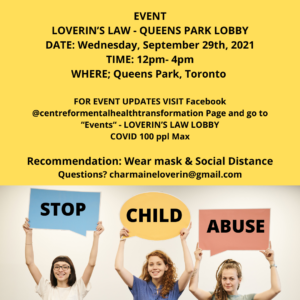Written by: Shailja Desai, Graduate Student – Addictions and Mental Health program, B.A., Practicum Student
Many survivors of childhood sexual abuse experience grief – a complex response to the loss of something important to an individual – related to the childhood sexual abuse they experienced. The grief and loss related to CSA that many survivors experience might not often be discussed due to the nature of the loss. Survivors may experience a sense of loss that cannot be publicly and socially mourned and supported, and which may be more difficult to acknowledge. These losses – which are commonly associated with CSA – include a loss of safety, attachment, and childhood innocence, as well as the loss of personal agency, of interpersonal agency, and of sexual agency (Ebrahim et al., 2021; Sofka, 1999). Such losses are often not acknowledged or mourned openly and publicly due to the stigma that is connected to childhood sexual abuse; this, in turn, may negatively impact survivors’ ability to process their grief. As such, many survivors may attempt to process and cope with their grief in private – and while there is no one way to grieve, there can unhealthy ways of attempting to cope with that grief.
There are multiple stages of grief that are commonly experienced by individuals, but that is not to say that every person will experience them in the same way. Some individuals might not experience every ‘stage’ or will do so in a different order; others may revisit past stages repeatedly as they continue to heal. Some of these stages of grief that are common to many survivors of CSA are as follows:
Shock & denial
Many people may become emotionally numb due to the shock and confusion they feel after such traumas. Survivors also may commonly deny what happened or try to downplay the impact of the abuse. Both these responses are normal coping responses that aim to protect oneself and help a person process and prevent them from feeling completely overwhelmed.
Fear, panic, shame
Survivors might also experience feelings of fear, panic, or shame when they are no longer feeling emotionally numb, having internalized the messages that emphasize guilt and shame. In this stage of grief, survivors might find it helpful to focus on self-compassion and the reminder that the trauma was not their fault, that they are not responsible for the abuse.
Rage &/or helplessness
Another common stage of grief has to do with feelings of rage and anger, and of helplessness and sadness. The anger may even be masking the other emotions and pain an individual may be feeling, as well as potentially being directed at others or at oneself.
Guilt & ambivalence
This is a stage during which individuals may feel that the loss they have experienced is unbearable, as well as experiencing feelings of guilt and shame.
Focused anger & letting go
This stage of grief is one in which survivors might combine and face the rage and sadness they feel to reach a state of focused anger.
Exploration & new identity
Survivors might find themselves in a vulnerable yet fluid state that may provide an opportunity to explore one’s identity beyond simply surviving CSA and to get to know oneself better.
Acceptance
Reaching this stage does not necessarily mean a person has moved past their grief and is no longer grieving. It may instead simply mean that they have come to accept and understand their grief and loss and what that means within their life.
There are different things that may be helpful for individuals struggling with grief related to childhood sexual abuse, including:
- Seeking support for grief & loss by turning to trusted friends or family members
- Speaking with a qualified therapist, social worker or other mental health professional
- Joining a support group
- Expressing feelings in a way that is tangible
- Practicing self-care – including by taking care of physical health, preparing for triggers, engaging in hobbies and interests, etc.
And lastly, it’s important to note that there is no single way to grieve and that everyone experiences grief and loss differently. Not everyone will experience each stage of grief, while others may return to previous stages more than once. Overall, grief is a normal response to the loss and pain that survivors experience in childhood, and it is okay to feel and to acknowledge this pain, anger, and sadness.
References
Ebrahim, B. K., Fouche, A., & Walker-Williams, H. (2021). Losses associated with childhood sexual abuse in women survivors: A scoping review. Trauma, Violence, & Abuse, 1-13. DOI: 10.1177/15248380211013137
Mothers of Sexually Abused Children. (2021). Grief reactions in victims. https://www.mosac.net/GriefReactionsInVictims.aspx
Sofka, C. J. (1999). For the butterflies I never chased, I grieve: Incorporating grief and loss issues in treatment with survivors of childhood sexual abuse. Journal of Personal & Interpersonal Loss, 4(2), 125-148, DOI:10.1080/10811449908409722
Williams, C. (2018, April 18). 4 stages of emotions and treatment after sexual trauma. GoodTherapy. https://www.goodtherapy.org/blog/4-stages-of-emotions-and-treatment-after-sexual-trauma-0418185



